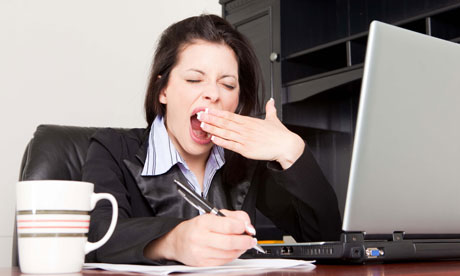
One in three British workers suffers from poor sleep, research shows, with stress, computers and taking work home blamed for the lack of quality slumber.
Some employees get less than five hours sleep a night, only one in seven feels completely refreshed when they wake and more women have poor shuteye than men. The alarming findings emerged from a study of self-assessments completed by 38,784 staff working in the UK for firms such as telecoms firm O2, drugs developer Quintiles and medical technology manufacturer Medtronic.
A third were dissatisfied with the amount and quality of their sleep, with 8.4% saying they were "very unhappy" with it and another 24.4% describing themselves as "unhappy". When asked how they felt 30 minutes after getting up, only 15.5% said "refreshed". Of the others, 3.3% said they were "exhausted", 24% said "unrefreshed" and 57.2% were still "a little tired".
While experts say that everyone should ideally get seven to eight hours sleep a night, only 38.5% of the 38,784 respondents did so. More had between five and seven hours (45%) and 5.4% existed on less than five hours, though a lucky 10% reported sleeping for eight to nine hours and one in 100 enjoyed more than nine hours.
When researchers combined those results to give each respondent an overall "sleep score" out of 100, some 33.8% got a mark of less than 30 – the lowest category. That means someone either has, or is at high risk of developing, a sleeping problem.
"This research is telling us that a large number of working adults, one in three in the UK, has a sleeping problem," said Dr Tony Massey, medical director of Vielife, the health and productivity firm that carried out the assessments between 2009 and 2011. "A very concerning number of British workers get too little sleep."
The problems faced by at least half and up to 80% of these one in three are so acute that their GP could diagnose them with a sleep disorder, he said. He had expected to find about one in 10 employees suffering such chronic sleep problems "but this widespread lack of sleep is beyond what I'd imagined". Britain is near the top of an international league table for lack of sleep. A Vielife study of 116,452 staff in America found that 23.4% scored poorly for sleep.
The extent of inadequate rest has prompted fears that many people are too tired to do their jobs properly, with some so sleep-deprived their brains are as confused as if they had consumed too much alcohol.
"British employers should be very worried about these findings," said Massey. "Organisations that have employees that sleep better perform better in the marketplace. Staff who sleep badly say they don't feel good, can nod off at their desk, have trouble concentrating, and are more prone to viruses and infections."
Workers who smoke, get migraines, have high blood pressure or take little exercise are more prone to bad sleep. Curiously, drinking alcohol was correlated with a slightly higher "sleep score" – 52.7 for drinkers versus 48.5 for non-drinkers. The study also uncovered a very close relationship between depression and poor sleep.
Too few people practised "sleep hygiene", said Massey. "That involves little things that people can do without professional help, like ensuring your room is dark and quiet, getting to bed at the same time every night – just like a two-year-old – reading a book, which is a proven relaxant, and not looking at bright screens, such as the TV or computer, for an hour before you go to bed as that will disturb your sleep."
The growing tendency for employees to do extra work in the evenings and at weekends, which may have risen in the recession, also seems to be linked to poor sleep. "More people are scrunching the golden hour before they go to sleep, and they are paying the price in that their sleep isn't refreshing and they end up in a vicious cycle of fatigue, poor productivity and then feeling that they have to do the same again the next day to compensate," said Massey.
The best guarantee of good quality shut-eye is to work five days a week and sleep seven to eight hours a night. Five-days-a-week staff had the best sleep score, while those getting seven to eight hours a night scored 72.7. Those on only five to seven hours got 36.8.
Happy employees also seem to get the best kip. Those saying they were "very satisfied" with their job, or had "complete" control over it, got the best sleep scores in those categories. Those who said they had "lots of energy" or were never depressed also enjoy good rest.
"These are very worrying findings because lack of sleep is a risk factor for a whole range of serious health problems, such as stroke and heart disease," said Massey.

